Recent graduates from Singapore’s universities are finding it increasingly difficult to secure employment, with many citing intense competition, unclear employer expectations, and lengthy hiring processes as major hurdles.
A CNA straw poll conducted between 7 and 10 August surveyed 105 respondents from the 2024 and 2025 graduating cohorts – all Singapore citizens or permanent residents aged 22 to 27 from eight local universities.
Of those polled, 28 graduates (26.7 per cent) had yet to secure a full-time job, and a quarter of this group said they were not confident of finding one within the next six months.
Across all respondents, 60 per cent described their job search as “somewhat difficult” or “very difficult”.
This reflects findings from the latest Joint Autonomous Universities Graduate Employment Survey, released in February, which reported a drop in fresh graduate employment within six months of completing final exams — from 89.6 per cent in 2023 to 87.1 per cent in 2024.
The proportion in full-time roles also fell from 84.1 per cent to 79.5 per cent.
Intense Competition and Complex Processes
The CNA poll found that 67.6 per cent of respondents cited “intense competition from other applicants” as the top challenge.
Graduates noted that popular job postings on LinkedIn often attracted hundreds of applicants within hours, with competition extending beyond fresh graduates to include mid-career professionals.
“It’s harder to even get the first-round interview, or to make it past interview stages,” one graduate said.
Another shared that applicants must apply almost immediately after a job is posted, or risk being overlooked as employers may have already reviewed thousands of applications.
She described the hiring process as exhausting, with multiple stages such as phone screenings, game-based assessments, AI-powered interviews, and case studies before in-person meetings.
More than half of those polled (56.2 per cent) said they would feel more confident in their job search if they had a clearer understanding of employer expectations.
Similar proportions highlighted the need for paid internships or traineeships (55.2 per cent) and more interview opportunities (54.3 per cent).
Some graduates said vague job listings made it difficult to assess their suitability for roles and called for greater transparency from employers to help applicants understand why they were rejected.
CNA’s poll also showed that 40 per cent of respondents saw a lack of industry contacts or networking opportunities as a barrier.
Tan See Leng’s call for grads to ‘keep open mind’ in their job search
The government has said it is working to improve employment outcomes for fresh graduates.
Minister of State for Trade and Industry Gan Siow Huang said on 9 July that authorities are “closely monitoring” the situation.
Institutes of higher learning are collaborating with agencies such as Workforce Singapore and the NTUC’s Employment and Employability Institute to organise career fairs, workshops, and mentoring sessions.
The Singapore Economic Resilience Taskforce, led by Deputy Prime Minister Gan Kim Yong, is also exploring measures to support new graduates.
The task force, set up in April, is addressing the wider economic impact of US-imposed tariffs.
Minister for Manpower Tan See Leng added on 10 July that entry-level job vacancies remain steady.
“To our 2025 graduates, it is still early in your job search. We encourage everyone to keep an open mind to different opportunities,” he said.
However, this message has drawn criticism from netizens, who argue it lacks actionable support.
Mixed Reactions from the Public
The CNA report sparked mixed responses on Reddit and under CNA’s Facebook post. Some netizens argued that current graduates are “too choosy”.


“In my opinion, the problem is too many fresh grads now,” one user commented.
The user added that everyone has their eyes set on a cushy, decent-paying 9-to-5 job, but the reality is that not everyone can have a comfortable office position.
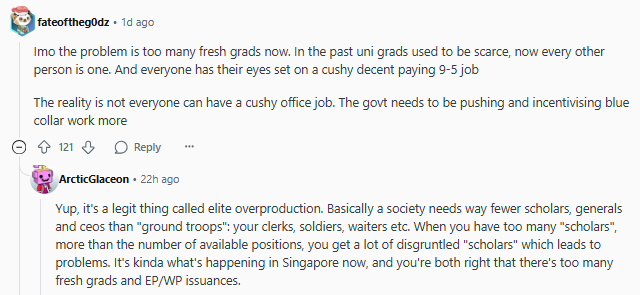
Others shifted the blame towards the government, accusing it of prioritising foreign talent.
According to Ministry of Manpower figures for 2024, Singapore’s total foreign workforce stood at 1,576,500, including 202,100 Employment Pass (EP) holders.


One user said the problem lies in the government’s approach to workforce management: while the number of fresh graduates has been increasing, there has been no corresponding reduction in EP issuances.
“What we would want is Singaporeans in white-collar jobs and foreigners in blue-collar work, not the other way around,” the user wrote.
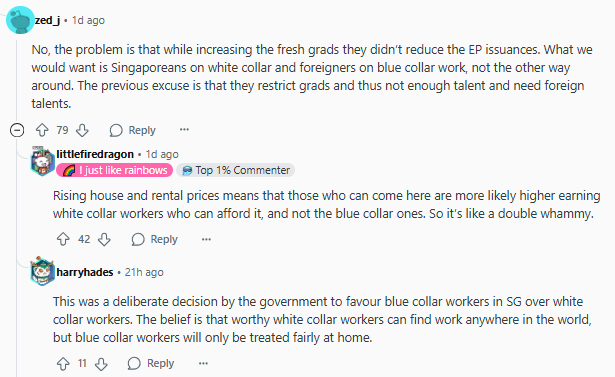
Another commenter highlighted that, beyond foreign talent, the continued development of AI would increasingly replace human workloads.
This, combined with a slowing global economy, was seen as a long-term challenge beyond the control of any taskforce.

Job Security and the Rise of Contract Roles
On Reddit, the original poster noted that the CNA article omitted a growing trend: many jobs secured by graduates are contract-based, typically lasting six months to a year, rather than being permanent.
Even government-linked agencies, they claimed, were offering such contracts.
This lack of job stability, combined with the high cost of living, was said to add immense stress for young workers.
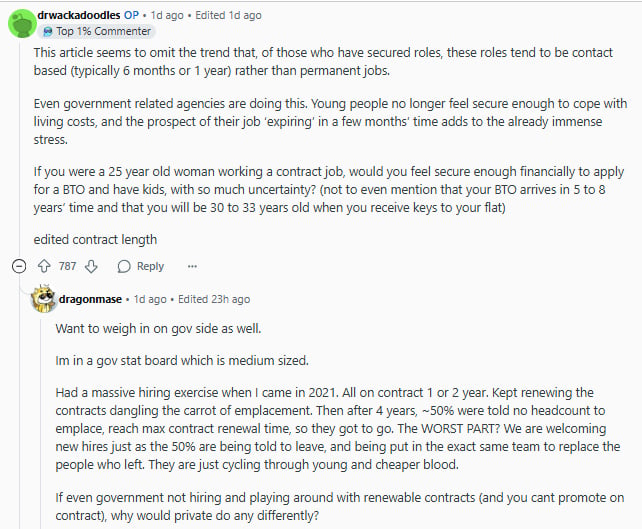
One commenter added that even in permanent roles, fresh graduates face a higher risk of being laid off because many companies adopt the “last in, first out” approach.
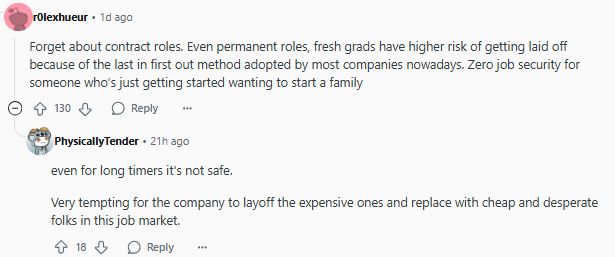
Criticism of Government Employment Practices
One user accused the government of sending mixed signals, stating that on one hand, it claims to be “working to improve” the situation, but on the other hand, it gives new hires zero job security, offers only contract positions, and provides no long-term benefits.
“When the government leads by example doing these things, how will the situation ever improve?” the user asked.
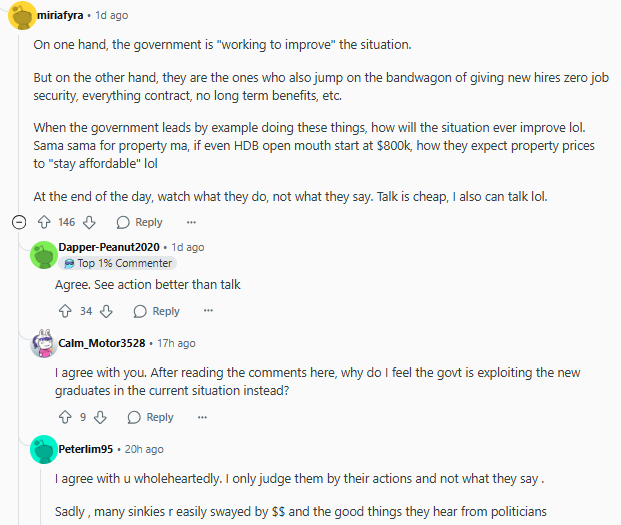
The post Singapore graduates face job market struggles as netizens highlight shifting employment trends appeared first on The Online Citizen.


